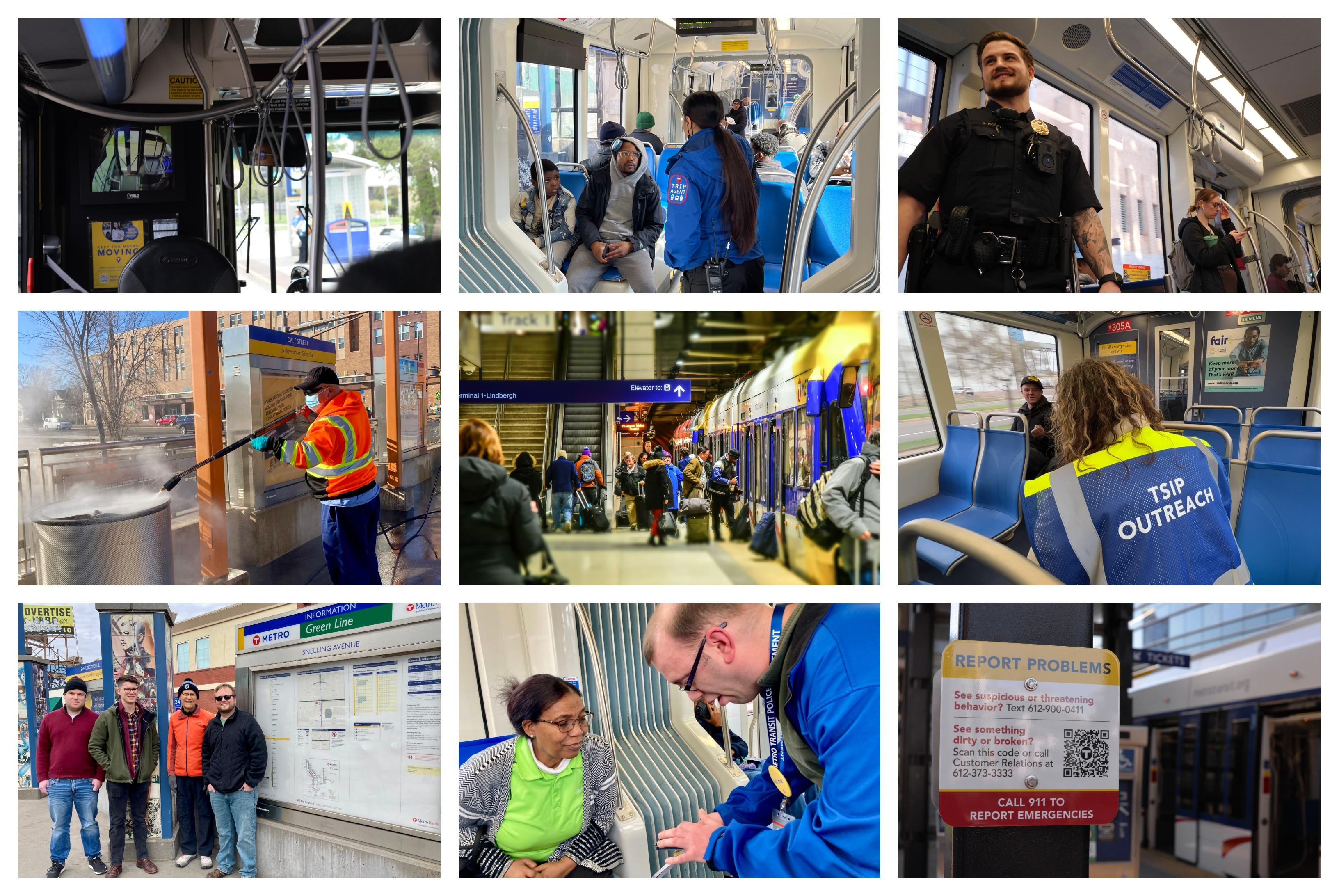
Metro Transit’s ridership continues to grow as efforts to improve conditions and expand the official presence on transit advance.
Through the end of March, more than 11.56 million rides had been taken across the agency’s bus, light rail, and commuter rail lines, a 13% increase compared to the same time last year. Average weekday ridership for March was 144,897.
Annual ridership increased 16% from 2022 to 2023, to more than 45 million rides.
“The continued increase in ridership is an encouraging sign that the efforts we’re making to provide a consistently high-quality experience are making a difference,” General Manger Lesley Kandaras said. “At the same time, I know from my own experiences and from hearing from riders and employees that we have much more work to do to improve conditions on our system.”
Nearly a year into her role as general manager, Kandaras has committed to riding every route and made meeting minimum ride requirements part of the performance reviews for Metro Transit leaders.
Efforts to improve the experience customers and employees have on transit are outlined in the agency’s Safety & Security Action Plan, which includes more than 40 action items informed by rider and employee feedback.
All the items in the plan are in progress or have been implemented. Notable recent developments include:
- The introduction of Transit Rider Investment Program (TRIP) Agents who are riding light rail vehicles to help customers feel more comfortable and to inspect fares. Since February, TRIP Agents have had more than 31,000 interactions with riders. The team will be expanded as recruitment efforts continue this year.
- An increased focus on cleaning and repair, including efforts to clean buses between trips at Brooklyn Center and Mall of America transit centers. Signs encouraging riders to report facility issues have also been posted at all light rail and bus rapid transit stations.
- The installation of more visible decals that help light rail customers know what vehicle they’re on when reporting issues through Text for Safety and the expanded use of onboard monitors that show real-time security footage, reminding people on buses that cameras are in use.
Throughout the year, Metro Transit will also be encouraging respectful behaviors and drawing attention to updated Rules for Riding and encouraging people to "Take Pride in Your Ride." The Rules for Riding outlines prohibited behaviors like harassment that can lead to removal from transit property and have been posted at all light rail and bus rapid transit stations.
Reported crime declines year-over-year
As part of Metro Transit’s quarterly update on Safety & Security Action Plan progress, the agency reports the latest crime data from the Metro Transit Police Department.
Overall reported crime declined 7.7% from the first quarter of 2023 to the first quarter of 2024; the most-serious crimes, including assault and robbery, declined by 16.4%. Most of the crimes that occur on transit are attributed to proactive policing, including drug violations and property damage.
“The increased presence of our police officers, employees, public safety partners, and riders are making a real difference," Police Chief Ernest Morales III said. "Our mission moving forward is to build on this foundation and to build a culture of shared ownership and responsibility."
The year-over-year decline in reported crime comes despite staffing challenges. The Metro Transit Police Department currently has 106 full-time officers, out of a budgeted strength of 171.
To build its ranks, the Metro Transit Police Department has launched a national recruitment campaign, increased starting hourly wages and began offering $4,000 educational stipends to full-time officers, and created a career pathways program for Community Service Officers, students who work for the department while earning law enforcement degrees.
Met Council supports safety initiatives
Metro Transit on Wednesday, May 1, will present its quarterly update on the Safety & Security Action Plan to members of the Metropolitan Council.
The Met Council helps set the direction for Metro Transit’s safety initiatives by setting policies, convening regional conversations and reviewing, and adopting budget proposals. In December 2023, the Met Council for the first time adopted the agency’s Code of Conduct and approved an expanded security contract. Supplemental security officers continue to work at several light rail stations and transit centers.
“The work of ensuring customers have a safe, welcoming, and comfortable ride never ends,” Met Council Chair Charlie Zelle said. “There is always a new level of excellence we can strive for, and as regional leaders we are committed to doing everything we can to continue raising the bar.”
Hiring success leads to service improvements
After hiring more than 400 operators in 2023 – the most in the agency’s history – Metro Transit remains focused on recruiting the frontline transit workers needed to expand service and vehicles and stations.
Wages for all positions represented by the ATU Local 1005 were increased earlier this year. The starting hourly wage for bus and train operators is $27.59 and the starting hourly wage for mechanic technicians is $37.80.
Higher wage rates are provided to second- and third-shift workers and a 4.5% increase will take effect for all represented employees in August. Hiring bonuses of up to $5,000 are provided for many positions.
With continued hiring success, the goal is to increase light rail service from every 15 minutes to every 12 minutes in August. Improvements to bus service are ongoing and the agency will open three new bus rapid transit lines in 2025.

Seeking customer, community feedback
Metro Transit leadership is inviting customers and community members to a series of May events that will inform future priorities. Public comment will be sought this spring and summer on a plan that will prioritize service improvements to be made over the coming years.